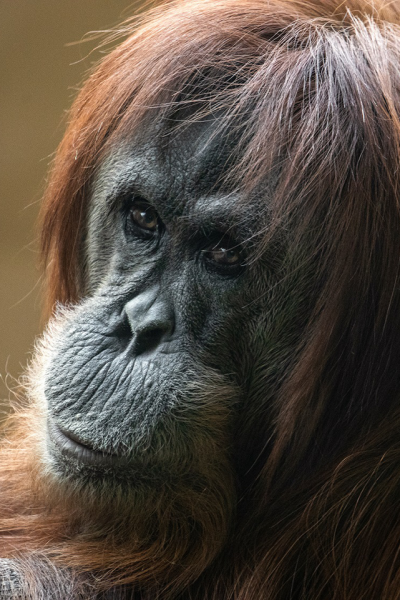
With spooky season just around the corner, many people are stocking up on candy. It may come as a surprise, but the type of candy you purchase has an impact on wild orangutan habitats because it likely contains palm oil.
Palm oil is a form of edible vegetable oil obtained from the fruit of the African oil palm tree. Palm oil is widely used in about half of the products we buy, ranging from food to cleaning supplies to cosmetics and more. As the demand for palm oil increased, unfortunately, so did unsustainable farming practices. Rainforests were cleared to quickly make way for more oil palm crops. It is grown in tropical areas, including Borneo and Sumatra, which are home to orangutans and other unique endangered species, like Sumatran rhinos and tigers.
Palm oil, when farmed responsibly, is really efficient compared to other edible oils. Oil palm trees – the plants palm oil comes from – produce four to ten times more oil per hectare than other popular oil crops like soy, olive, rapeseed and coconut. Boycotting palm oil would lead to increased demand for these other edible oils that require more land and resources to be cultivated.
Additionally, for many of the people who live in Indonesia and Malaysia, palm oil cultivation is their main source of income. If these people cannot rely on palm oil cultivation then they could turn to a different economic endeavor such as planting rubber trees, planting a less efficient oil crop, or even, unfortunately, illegal wildlife trading and hunting. Asking for sustainable palm oil means asking for the most efficient oil crop to be grown and harvested correctly with the least amount of impact on our planet.
“Palm oil isn’t the enemy, so we don’t think boycotting is the answer,” said Chelsea Wellmer, palm oil and conservation programs coordinator at CMZoo. “Boycotting is really difficult because there are over 600 names for palm oil on ingredient labels. You could be eating and using palm oil every day without being aware of it. Learning about palm oil and adding it to your list of things to consider as an ethical and conscientious consumer can make a big difference. With our free shopping app, we’ve made that easy for consumers in the U.S. and Canada.”
Cheyenne Mountain Zoo has been integral in promoting the worldwide effort to support sustainably produced palm oil. The Zoo’s free sustainable palm oil shopping guide mobile app, which consumers can use to discover their favorite companies’ level of commitment to using sustainable palm oil, has now been downloaded over 155,000 times and is being promoted by other zoos across the country.
To download the free app, search “Cheyenne Mountain Zoo palm oil” in the Apple App Store or Google Play, and look for the logo with the green orangutan. Once the app is installed, consumers can scan the bar codes of their favorite products to see how the Zoo has rated that company’s progress towards sourcing 100% certified sustainable palm oil.
All products listed in the app are from companies that are members of the Roundtable on Sustainable Palm Oil (RSPO). The Roundtable on Sustainable Palm Oil (RSPO) has established global standards for environmentally and socially responsible palm oil, and engages stakeholders as part of the solution to make sustainable palm oil the norm.
As long as the company is in the app, they have made a commitment to work towards using only certified sustainable palm oil that is deforestation-free. There are three ratings on the app:
- Green – excellent
- Yellow – good
- Orange – needs improvement
 The best way to help protect wild orangutan habitats from destruction due to unsustainable palm oil production is to show large companies that consumers will choose products made by companies that have committed to sustainable production over those that have not.
The best way to help protect wild orangutan habitats from destruction due to unsustainable palm oil production is to show large companies that consumers will choose products made by companies that have committed to sustainable production over those that have not.
“We understand there are a myriad of issues to consider as a conscientious consumer,” said Wellmer. “As animal advocates and palm oil experts, our goal is to arm consumers with the knowledge that this is another important aspect to consider as they make decisions.”
CMZoo’s palm oil team can also help consumers encourage their favorite companies to make the commitment to using sustainably produced palm oil in their products.
“If there’s a company that you love, because they meet the rest of your ethical standards, but they’re falling short of protecting wild places through sourcing sustainable palm oil, we can help,” said Wellmer. “Our online palm oil resource tool kit has free letter-writing resources that we have seen make an impact with companies. Information is power, and we can help companies learn why they should commit to using only sustainable palm oil in their products.”
Next time you’re visiting CMZoo’s orangutans at Primate World, check out the palm oil resources and activities available. You can also learn more about the use of certified sustainable palm oil and download the Zoo’s free palm oil shopping app by visiting cmzoo.org/palmoil.

